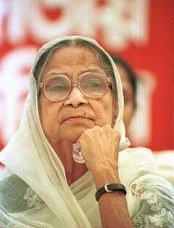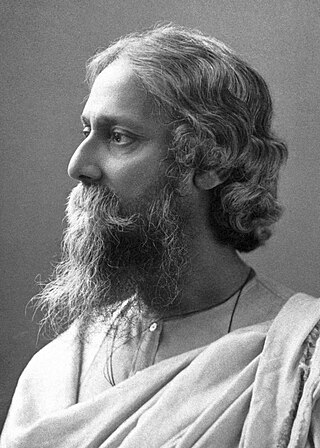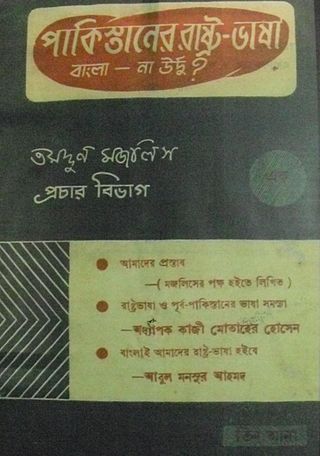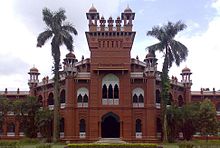
The Bangla Academy is the official regulatory body of the Bengali language in Bangladesh. It is an autonomous institution funded by the Government of Bangladesh that fosters the Bengali language, literature and culture, works to develop and implement national language policy and conducts original research in Bengali. Established in 1955, it is located in the Burdwan House in Shahbagh, Dhaka, within the grounds of the University of Dhaka and Suhrawardy Udyan. The Bangla Academy hosts the annual Ekushey Book Fair.

Muhammad Shahidullah was a Bengali linguist, philologist, educationist, and writer.

Begum Sufia Kamal was a Bangladeshi poet, feminist leader, and political activist. She took part in the Bengali nationalist movement of the 1950s and civil society leader in independent Bangladesh. She led feminist activism and was a president of Bangladesh Mahila Parishad. She died in 1999 and was the first woman to be given a state funeral in Bangladesh.

Rajbari is a district in central Bangladesh, located in the Dhaka Division. It is a part of the Greater Faridpur subregion of Bengal due to the historical and cultural identities of its inhabitants, with Kushtia border on the west, Rajbari is also the meeting point of two distinctive culture of Bangladesh.
Mohammad Yakub Ali Chowdhury was a Bengali essayist and journalist. He was noted as one of the few Bengali Muslim literary scholars of his time.

Bengali novels occupy a major part of Bengali literature. Despite the evidence of Bengali literary traditions dating back to the 7th century, the format of novel or prose writing did not fully emerge until the early nineteenth century. The development of Bengali novel was fueled by colonial encounter, booming print culture, growth of urban centers, and increased middle-class readership Upanyas, the Bangla word for novel, is derived from the words upanay and upanyasta.

The Tamaddun Majlish, formerly Pakistan Tamaddun Majlish, is an Islamic cultural organization in Bangladesh, established in 1947 by Principal Abul Kashem in the former East Pakistan. It was one of the founding organizations of the Bengali Language Movement.

Qazi Motahar Hossain was a Bangladeshi writer, scientist, statistician, chess player, and journalist.
Kazi Abdul Wadud was a Bengali essayist, prominent critic, dramatist and biographer. He was born into a lower-middle-class family, in larger Faridpur (present) Rajbari, Pangsha. His father's name was Kazi Sagiruddin.
Kazi is a family name in Bengal, it originates from the Arabic qadi meaning judge and is typically used among Muslims. Kazi, also spelt Qazi and Quazi, is a title awarded to Islamic judges, commonly used hereditarily in Bengal as a family name.

Ubaidullah Al Ubaidi Suhrawardy was a Bengali Islamic scholar, educationist and writer from Midnapore. He is often regarded as the Father of modern Islamic education in Bengal.

Pakistaner Rashtra Bhasha: Bangla Na Urdu? is a small book published on 15 September 1947 by Bengali language movement pioneer Principal Abul Kashem on behalf of Tamaddun Majlish. Within one month of Pakistan's Independent by publishing this book, it demanded introduction of Bengali as one of the state language of whole Pakistan. This book also strongly advocated for Bengali as the medium of education, court language and for its use in the offices in East Pakistan.
Muhammad Ishaq was a Bangladeshi historian and academic.
Muslim Sahitya-Samaj was an influential literary and cultural organization. It was based in Dhaka.
Shashwata Banga(Bengali: শাশ্বত বঙ্গ) is a book on Bengali language, Bengali literature, and the cultural history of Bengalis. It is considered an important documentary work in Bengali literature. It offers a perspective on the thoughts and culture of Bengali society. The language and analysis of the book encourage intellectual thought, making it recognized as a progressive piece of Bengali literature. The book reflects the ideas of the Freedom of Intellect Movement.








